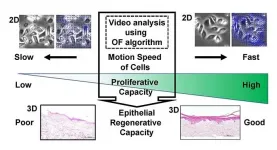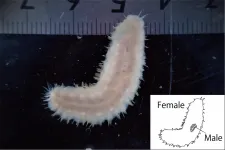(Press-News.org) Carried like stowaways in the guts of international travelers, new and potentially deadly strains of antimicrobial resistant superbugs may be coming to a community near you, suggests new research from Washington University School of Medicine in St. Louis.
"Even before the COVID-19 pandemic, we knew that international travel was contributing to the rapid global increase and spread of antimicrobial resistance," said Alaric D'Souza, an MD/PhD student at Washington University and a co-first author of the study to be published June 6 in Genome Medicine. "But what's new here is that we've found numerous completely novel genes associated with antimicrobial resistance that suggest a worrisome problem on the horizon."
The research confirms that international travelers often return home with an unexpected bounty of new bacterial strains jostling for position among the thousands that normally reside within the gut microbiome.
Poverty, poor sanitation and changing agricultural practices have turned many low-income, developing regions into hot spots for diseases spread by bacteria, including infections that are increasingly resistant to a range of antibiotic drug treatments.
High-population densities make it easy for these bacteria to be shared among community residents and travelers through exposure to contaminated drinking water and food, or poorly sanitized restrooms, restaurants, hotel rooms and public transportation. Back at home, travelers run the risk of transferring these novel bacteria to family, friends and other community residents.
The research, conducted with Maastricht University in the Netherlands, involved analyzing bacterial communities in the gut microbiomes of 190 Dutch adults before and after travel to one of four international regions where the prevalence of resistance genes is high: Southeastern Asia, South Asia, North Africa and Eastern Africa.
Fecal samples analyzed as part of the study were randomly selected from a larger, multicenter investigation of about 2,000 Dutch travelers, the majority of whom were tourists, known as the Carriage Of Multi-resistant Bacteria After Travel (COMBAT) study.
"We found significant travel-related increases in the acquisition of resistance genes, abundance and diversity encoded by bacteria that are endemic to the region visited," D'Souza said. "These findings provide strong support for international travel as a vector for the global spread of clinically important antimicrobial resistance genes and highlight the need for broader surveillance of antimicrobial resistant bacteria in the gut microbiomes of returning travelers."
The new study was designed by co-senior authors John Penders, a medical microbiologist at Maastricht University, and Gautam Dantas, PhD, a professor of pathology & immunology at Washington University. Manish Boolchandani, PhD, a member of the Dantas Lab during the research and a 2020 graduate of the university's doctoral program in Computational and Systems Biology, is also a first author on the paper.
The World Health Organization, the U.S. Centers for Disease Control and Prevention, and other agencies have described the rapid spread of antimicrobial resistance as one of the most serious public health threats now facing the world -- a looming medical catastrophe that could outweigh the chaos created by the COVID-19 pandemic.
"While previous studies have scanned travelers' stool samples for well-known antimicrobial resistant bacteria, we used a combination of whole metagenome shotgun sequencing and functional metagenomics to identify both known and novel genes that code for antimicrobial resistance," Dantas said.
More traditional genomic techniques look for distinctive genetic signatures of individual pathogens. But such tests can only find known pathogens, while metagenomic sequencing can identify all organisms present in a given sample: good bacteria, dangerous bacteria and even those that are completely new.
In all, the researchers detected 121 antimicrobial resistance genes across the gut microbiomes of the 190 Dutch travelers. More than 40% of these resistance genes (51 of them) were only discovered using the more sensitive metagenomics technique, suggesting that potentially dangerous genes are being missed by the more conventional approaches.
Equally concerning, the study's results confirmed that 56 unique antimicrobial resistance genes had become part of the travelers' gut microbiomes during their trips abroad, including several mobile, high-risk resistance genes, such as extended-spectrum β-lactamases (ESBL) and the plasmid-borne colistin resistance gene, mcr-1.
Resistance to beta-lactam antibiotics is emerging worldwide and confers broad resistance to treatment by penicillins and other important antibiotics.
The mcr-1 genes protect bacteria from another antimicrobial drug called colistin, which is the last-resort treatment for infections by multidrug-resistant gram-negative bacteria. If colistin resistance spreads to bacteria that are resistant to other antibiotics, those bacteria could cause truly untreatable infections, the CDC has warned.
Because metagenomic analysis allows researchers to study all the bacteria and genes in a collection of gut microbiome samples as one, large mixed community of organisms, it also provides opportunity to explore complex ecological interactions between these organisms.
While bacteria may slowly evolve resistance from repeated exposures to antibiotics over time, diverse bacterial communities also share antimicrobial resistance genes through a more rapid process known as horizontal transfer, usually via the exchange of mobile genetic elements that allow snippets of DNA to jump from one bacterium to another.
"Since genes that code for resistance to different classes of antibiotics are often located on the same mobile elements, a single horizontal exchange has the potential to convert bacteria previously susceptible to antibiotics into a multi-drug resistant organism," said Dantas.
Researchers also used metagenomic techniques to piece together important contextual information about resistance gene location and function.
"There was significant association of resistance genes with mobile genetic elements, a primary way that resistance genes spread among bacteria," D'Souza said. "Though our study was unable to demonstrate resistance genes are carried by pathogenic bacteria, it's clear that this is possible. Additionally, international travelers have the potential to introduce resistance genes into their own communities when they return home, and future studies directly addressing this possibility are a priority."
Added Dantas: "Identifying new antimicrobial resistant bacteria and genes could play an important role in slowing the global spread of resistance and guide potential treatments for related diseases. Our study lays the groundwork for those efforts by offering new insight into the genetic mechanisms that underlie the rapid acquisition and sharing of antimicrobial resistance genes across people's gut microbiomes during international travel."
INFORMATION:
Climate experts warn that, without urgent action, climate change will continue to cause an increase in the intensity of extreme rainfall that can lead to severe flooding.
An international research team have concluded that increases in extreme rainfall and associated flooding are projected to continue as global temperatures continue to rise. Efforts to limit warming to +1.5C will help limit changes in extreme rainfall, though some societal adaptations will still be required.
Sharing their findings in a new ScienceBrief Review, published today (7 June), scientists ...
Niigata, Japan - A comprehensive investigation on cells and colony motion offers new insight into the proliferative and epithelial regenerative capacities of human primary oral keratinocyte cultures with implications for quality control of engineered cells used in regenerative medicine. Dr. Kenji Izumi and his colleagues, Dr. Emi Hoshikawa and Dr. Taisuke Sato, modified the optical flow (OF) protocol originally presented in their 2019 paper to add the capacity to determine the threshold of the cells/colony motion speed required to differentiate substandard oral keratinocyte populations before manufacturing a tissue-engineered oral mucosa tissue construct. ...
The world is one step closer to ultimately secure conference calls, thanks to a collaboration between Quantum Communications Hub researchers and their German colleagues, enabling a quantum-secure conversation to take place between four parties simultaneously.
The demonstration, led by Hub researchers based at Heriot-Watt University and published in Science Advances, is a timely advance, given the global reliance on remote collaborative working, including conference calls, since the start of the C19 pandemic.
There have been reports of significant escalation of cyber-attacks on popular teleconferencing platforms in the last year. This advance in quantum secured communications could lead to conference calls with inherent unhackable security measures, underpinned by the principles of ...
In the Kumano Sea, off the southeast coast of Japan, an evolutionary mystery lay in wait. Researchers collected samples from the muddy sea floor, including hermit crabs, mollusks and discarded shells. Here, in and on these shells, they found scale worms living mostly in pairs with a striking difference compared to the almost 900 already known species of scale worms: one was a quarter the size of its mate.
The discovery was published on March 29 as the cover of the Journal of Zoological Systematics and Evolutionary Research.
"The species is characterized by males being dwarf, with their minute bodies always riding on the dorsal side of females," said paper author Naoto Jimi, postdoctoral researcher at the National Institute of Polar Research, Research ...
(Geneva, 5 June 2021) Mass screening of school age children has led to significantly higher numbers of coeliac disease cases being diagnosed, according to a new study presented today at the 6th World Congress of Paediatric Gastroenterology, Hepatology and Nutrition.
Researchers in Italy found double the number of cases of the autoimmune disease - where the body produces antibodies to gluten, a protein found in wheat, barley, and rye - in school children compared to a similar study by the same group 25 years ago.
A new screening programme of 7,760 children aged from five ...
(Geneva, 5 June 2021) Procedures to prevent the direct transmission of hepatitis B virus (HBV) from mother to child, particularly during and after pregnancy, have significant fragmentation and gaps, a new survey presented at the 6th World Congress of Paediatric Gastroenterology, Hepatology and Nutrition has shown.
The results, based on 76 delivery hospitals from ten major European countries*, identified significant variances in maternal HBV screening frequency during pregnancy: 53% in the first trimester, 1% in the second trimester and 46% in the third trimester. Alarmingly, only 38% of those women who tested positive with high HBV-DNA levels were treated ...
MADISON, Wis. -- If you're wearing gold jewelry right now, there's a good chance it came from an illegal mining operation in the tropics and surfaced only after some rainforest was sacrificed, according to a team of University of Wisconsin-Madison researchers and alumni who studied regulatory efforts to curb some of these environmentally damaging activities in the Amazon.
The researchers, including UW-Madison geography Professor Lisa Naughton, investigated mining-related deforestation in a biodiverse and ecologically sensitive area of the Peruvian Amazon to see whether formalizing and legalizing these mining operations might curb some of their negative effects.
Their study, published June 2 in the journal Environmental Research Letters, was co-authored by a group including UW-Madison ...
In a large, international retrospective study, men at high risk for death from prostate cancer had a significant reduction in all-cause mortality if treated with radiation shortly after surgery.
Prostate cancer is one of the most common forms of cancer among men, and about 1-in-8 of them will be diagnosed with it during their lifetime. While most men are cured with available treatment, there remains a group at high risk for death. In the United States in 2020, 33,330 men died from the disease, making prostate cancer the second leading cause of cancer death for men in this country. Therefore, among those at highest risk of recurrence, metastasis, and death from prostate cancer, understanding what steps can be taken to lower these risks could save and extend lives.
Early ...
Oak Brook, IL - The June edition of SLAS Discovery features the cover article, "A Perspective on Synthetic Biology in Drug Discovery and Development--Current Impact and Future Opportunities" by Florian David, Ph.D. (Chalmers University of Technology, Gothenburg, Sweden), Andrew M. Davis, Ph.D. (AstraZeneca, Cambridge, England, UK). Michael Gossing, Ph.D., Martin A. Hayes, Ph.D., and Elvira Romero, Ph.D., and Louis H. Scott, Ph.D. (AstraZeneca, Gothenburg, Sweden), and Mark J. Wigglesworth, Ph.D. (AstraZeneca, London, England, UK).
In January 2021, a survey of immunologists, infectious-disease researchers and virologists found that 90% of respondents believe SARS-CoV-2 will become endemic, continuing to circulate in pockets of the global population ...
An international subject pool was studied to confirm the effectiveness of a whole food complete vitamin and meal replacement product, IQed. The article, co-authored by Lisa Geng; Francine Hamel, EdD, SLP-CCC; Doreen Lewis, Ph.D., appeared in the peer-reviewed journal, Alternative Therapies (Altern Ther Health Med 2021 Mar;27(2):11-20(.
The findings indicate that the carefully developed nutritional supplement, IQed Smart Nutrition, can help bolster key functions for people with a wide range of prevalent diagnoses including Autism, Apraxia, ...


